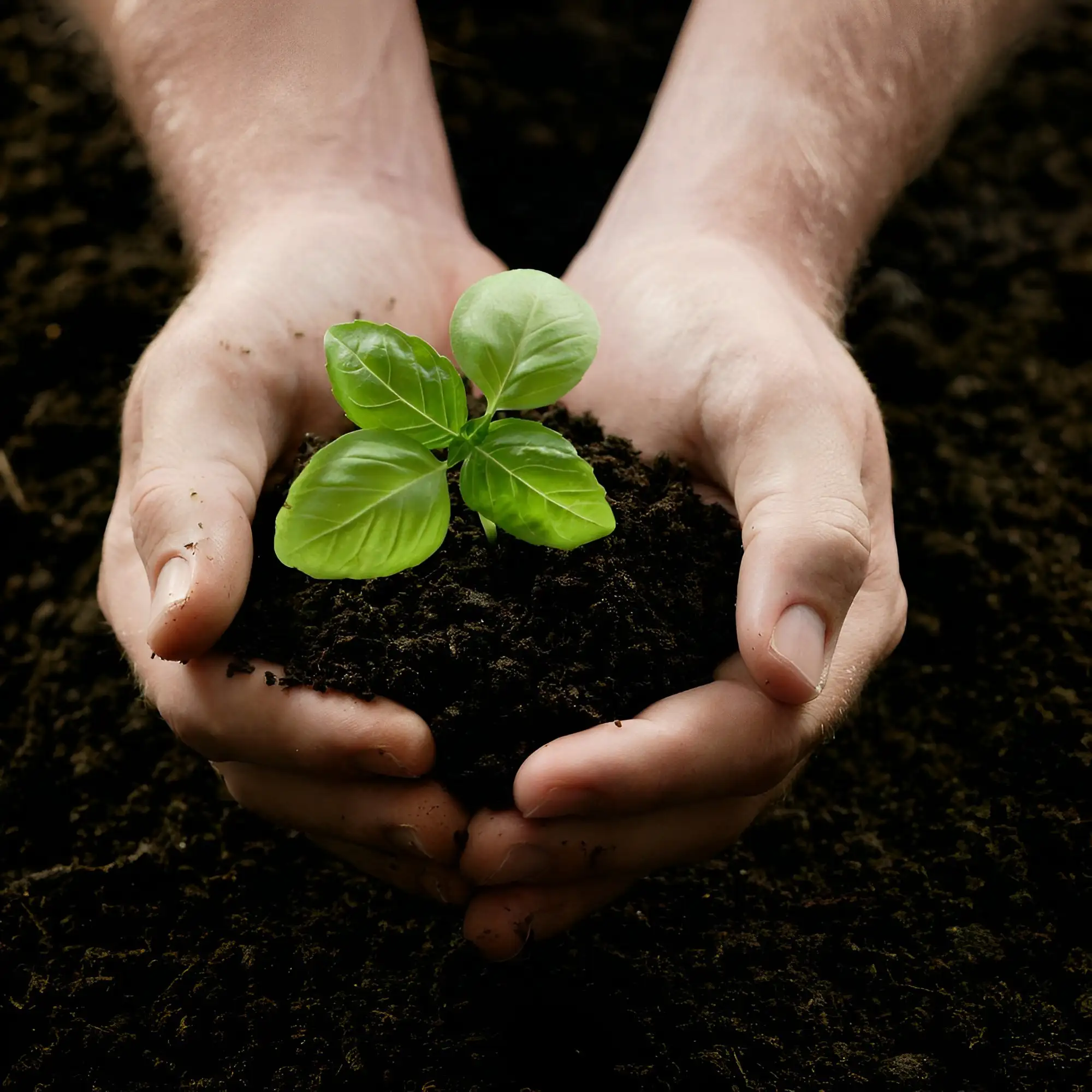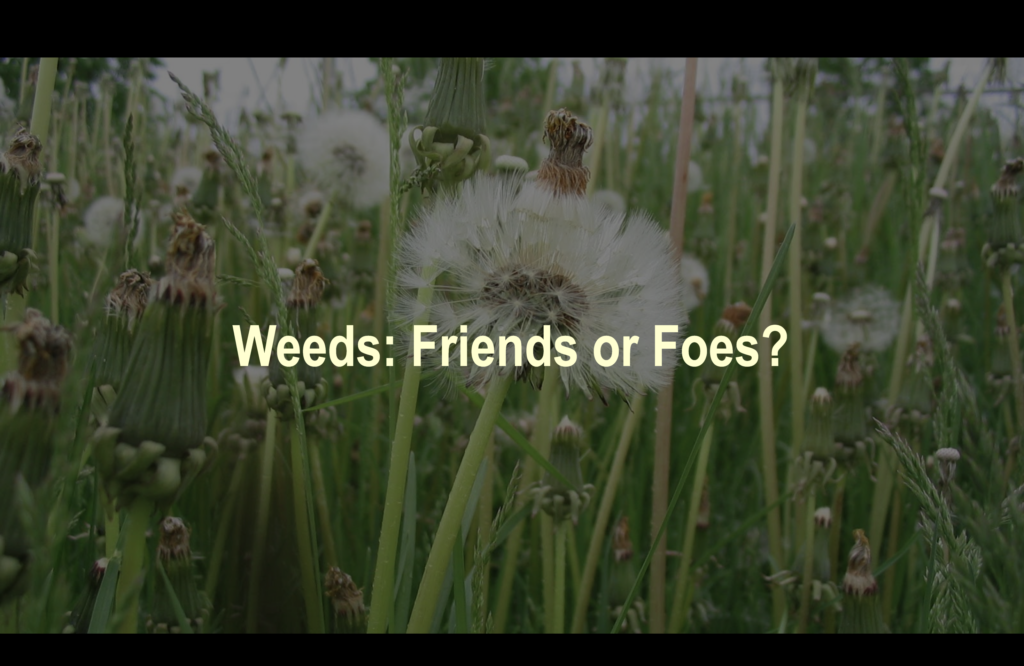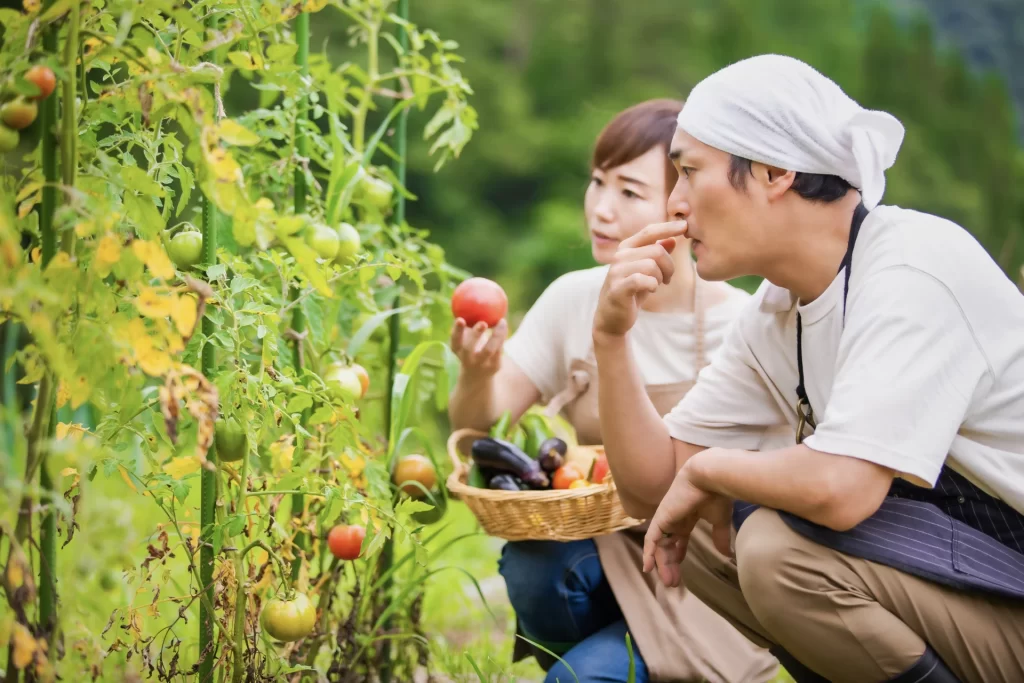In this article, we’ll delve into the importance of maintaining the cleanliness of soil for successful Nature Farming or Gardening. We will unravel the reasons why chemical fertilizers can be harmful, while also sharing the wisdom of Nature Farming’s founder, Okada Mokichi, who championed the power and vitality of soil.
Have you ever wondered how plants can thrive without chemical fertilizers or pesticides? This question frequently surfaces in our dialogues about gardening. Is it the sunlight? The water?
Here, we’ll delve into why we advocate avoiding chemical fertilizers, emphasizing that plants can flourish naturally without them. It’s about tapping into the innate strength of nature. The founder of Nature Farming, Okada Mokichi, expressed this beautifully:
“The Soil Itself is Fertilizer” – Okada Mokichi, Pioneer of Nature Farming
“Soil is made to produce enough food for feeding humans.”
Complete Works of Okada Mokichi
“First and foremost, do not pollute the soil, keep it clean, pure.”
“Remarkably, our love for and respect towards the soil enhances its inherent potentiality.” (1949, 1952, 1954)
Okada postulated that when the Earth was created, soil was destined to produce enough food to nourish humankind. As long as we maintain the purity of the soil, additional fertilizers are unnecessary. This soil potential is optimized when we live in harmony with universal laws.
Contrastingly, chemical fertilizers act as pollutants, disrupting the natural ecosystem (we’ll delve into this later). What we can do is to preserve the cleanliness of the soil, avoid chemical pollutants, and strive to maximize the potential power of the soil. This requires respect, love, and a willingness to work in concert with the soil’s natural processes.
Okada embarked on his experiments in 1935 and published his findings between 1949 and 1954. Although some of his insights, particularly the notion to “love the soil,” seemed nebulous at first, later scientific investigations into soil and its microorganisms validated and clarified Okada’s teachings.
The Living Soil
Soil is not merely an inanimate material. It’s teeming with life.
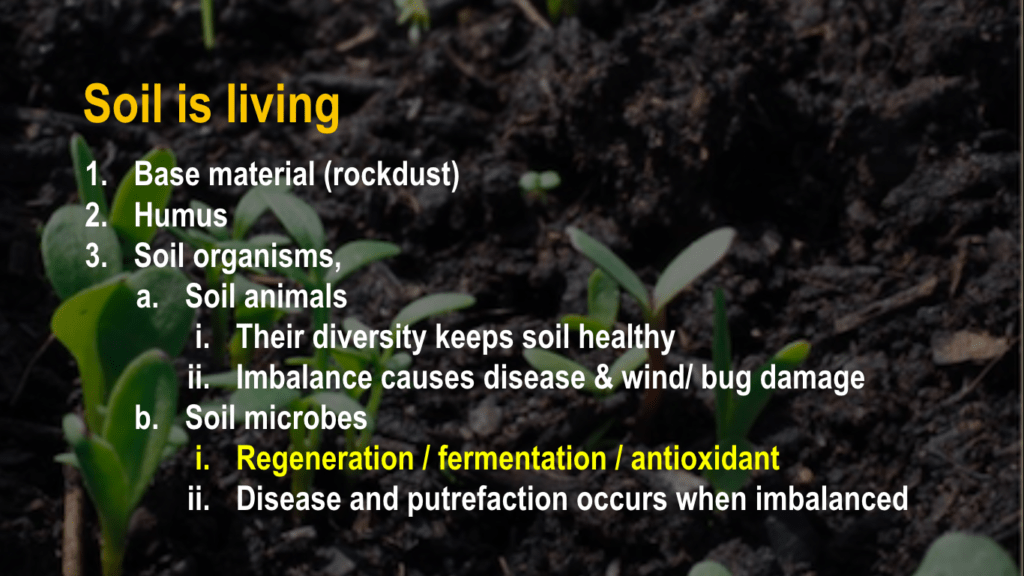
The physical aspects of soil encompass rock particles, humus, and organisms. As plants shed leaves, twigs, and other materials, these remnants accumulate and decompose over time alongside animal remains to form humus.
But what initiates this decomposition?
It is the Soil Organisms: animals and microorganisms. Many are too small to be seen with the naked eye, but they are very much alive.
Just like other living entities, soil breathes and requires air and water to sustain life. Think of it as your pet. If you shower your dogs with love, they respond in kind. Similarly, if you nurture the beneficial microbes in the soil, they too will respond positively. USDA provides good information on “Soil is Alive.”
To Love Soil is to Care for It
Okada’s idea of “loving the soil” essentially equates to taking good care of it.
In Nature Farming, your role is to foster a conducive environment for beneficial microbes to thrive. In doing so, they can regenerate, ferment the soil, and produce antioxidants vital for maintaining soil health. Healthy, vibrant soil, in turn, yields the sustenance we need daily.
So, what contributes to soil health? Diversity and balance. Various soil animals synergize their efforts to improve the environment, leading to fermentation and the production of antioxidants.
As you may know, some microbes are beneficial to us, while others are harmful. Some bacteria are opportunistic, aligning themselves with either good or bad microbes depending on the circumstances. It’s our responsibility to create an environment where these opportunistic bacteria lean towards supporting the beneficial microbes.
Interestingly, the microbes beneficial to us are believed to be remarkably sensitive to human emotions, particularly love. This might sound implausible, but personal experiences and the testimonies of many organic farmers support this concept. If we care for them properly, they will become more active and prolific.
Taking good care of soil means using natural methods to enhance its potential. This can include mulching, composting kitchen waste, and other techniques you can learn about in our blog articles. Gardening without chemicals might require more effort, but the joy and satisfaction it brings make it all worthwhile. So let’s embrace a more organic way of life, nurturing our soil as we would our loved ones.
The Consequences of Imbalance: Disease and Pest Damage
A decline in beneficial bacteria, or the dominance of harmful ones, can disrupt the diversity of the ecosystem, leading to diseases and pest damage. Putrefaction and oxidation often follow, catalyzed by the disruptive influence of chemical fertilizers.
Nature’s Balancing Act: The Maintenance of Soil Diversity
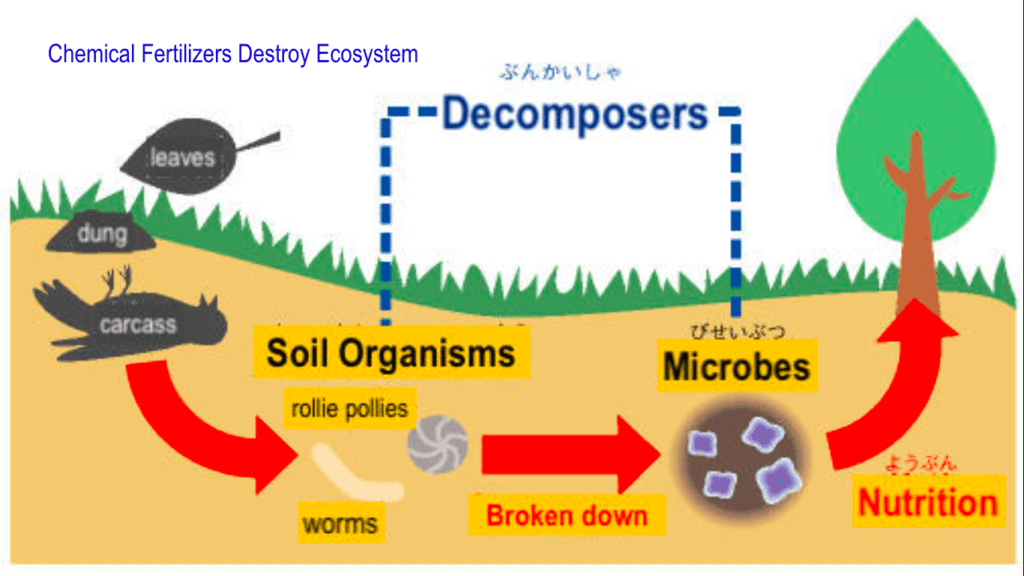
According to Okada, “Soil is designed to produce enough food to nourish humans if kept clean and pure.” Let’s delve into part of this natural ecosystem, examining how it supplies plants with nutrition.
Thanks to the tireless efforts of soil organisms and microorganisms, piles of leaves, twigs, dung, and carcasses are broken down into smaller particles. These decomposed materials are then absorbed by plants as nourishment. This cyclic process is a fundamental part of nature.
The Negative Impact of Chemical Fertilizers on Soil ‘Decomposers’
With the introduction of chemical fertilizers, this natural decomposition process becomes obsolete. Plants absorb the primary nutrient, synthesized nitrogen, directly, leaving the decomposers without their usual work. In time, the organisms that were once key players in the ecosystem die off due to their unnecessary existence.
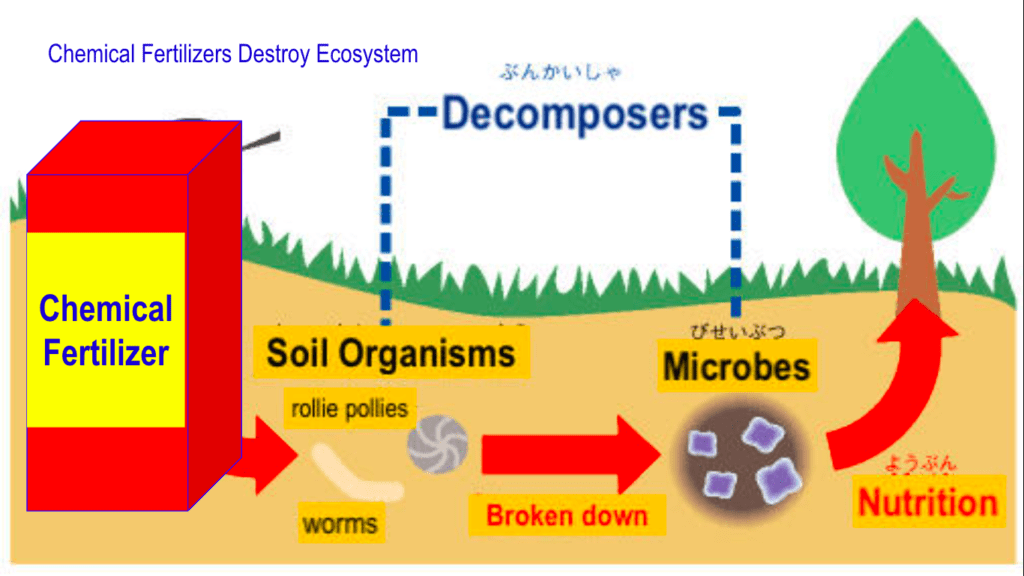
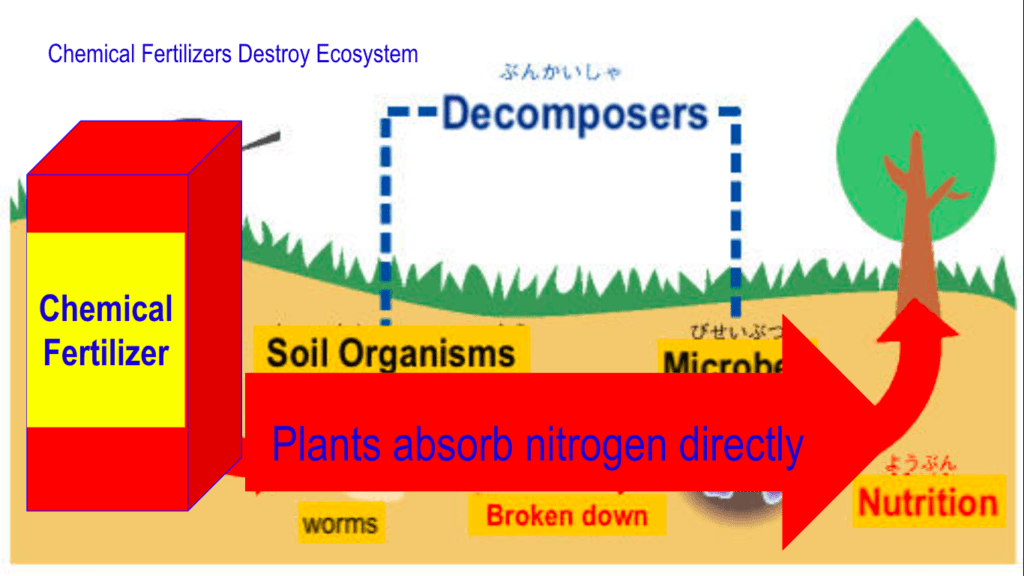
The Environmental Fallout of Chemical Use
Upon hearing that “plants directly absorb nitrogen,” one might think, “How efficient!” or “What a marvelous scientific progress!” However, this perceived convenience is the root of the problem.
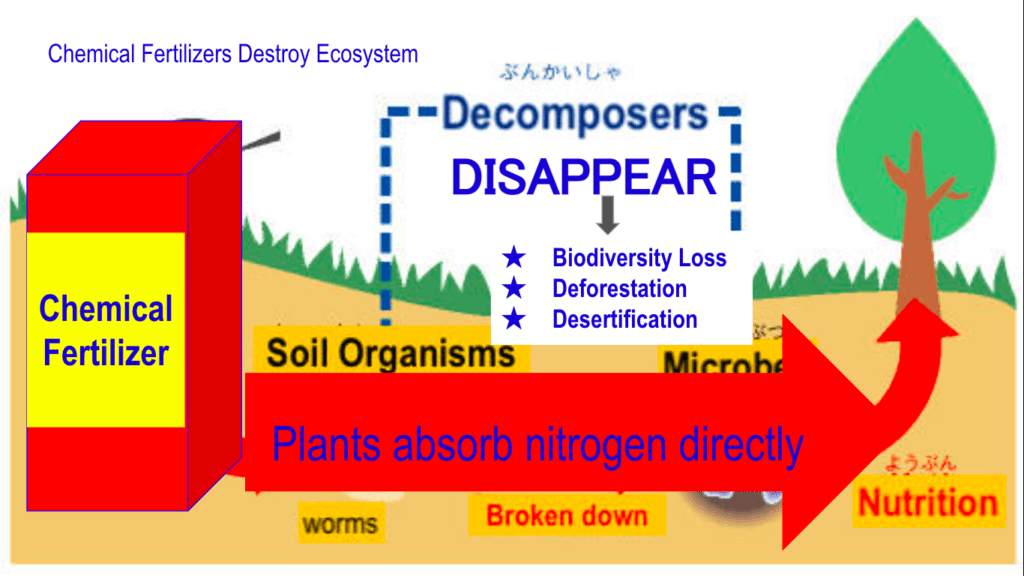
With the decomposers out of work and dying off, biodiversity suffers. Deforestation, topsoil erosion, and desertification are the inevitable consequences. The use of chemicals essentially undermines the natural ecosystem, causing severe environmental damage. Another resource about the advantages and disadvantages of Synthetic Fertilizers.
Restoring a Healthy Ecosystem through “Soil Love”
Looking at the world today, pollution is rampant. This signifies a decline in the critical role that beneficial microorganisms play in maintaining a healthy ecosystem, and a lack of concern in purifying the environment.
Modern agriculture faces a critical issue: the rampant use of not only chemical fertilizers but also pesticides and herbicides has led to a decrease in beneficial microorganisms, creating a diseased, putrefactive state that attracts harmful insects. Consequently, soil loses its original function of producing adequate food for humans.
We must heed Okada’s call to “love the soil,” focusing on purifying the environment to restore its health for the survival of all beings in the ecosystem.
Chemicals: Bug Magnets?
Okada highlighted an interesting phenomenon:
“As soon as the crop absorbs chemical fertilizer, it becomes toxic, and pests are attracted to it. (1949, 1952).”
Thus, chemical fertilizers, while detrimental to plants, attract pests and disease. Ironically, pests seem to target toxic plants, sparing humans the risk of consuming them – a silver lining, perhaps?
The Nitrogen-Aphid Connection
Recent research reveals that aphids are attracted to nitrogen-rich plants. Observations in gardens confirm this: aphids often target young seedlings and soft growing parts, which require a high nitrogen intake. This concurs with Okada’s statements made seven decades ago.
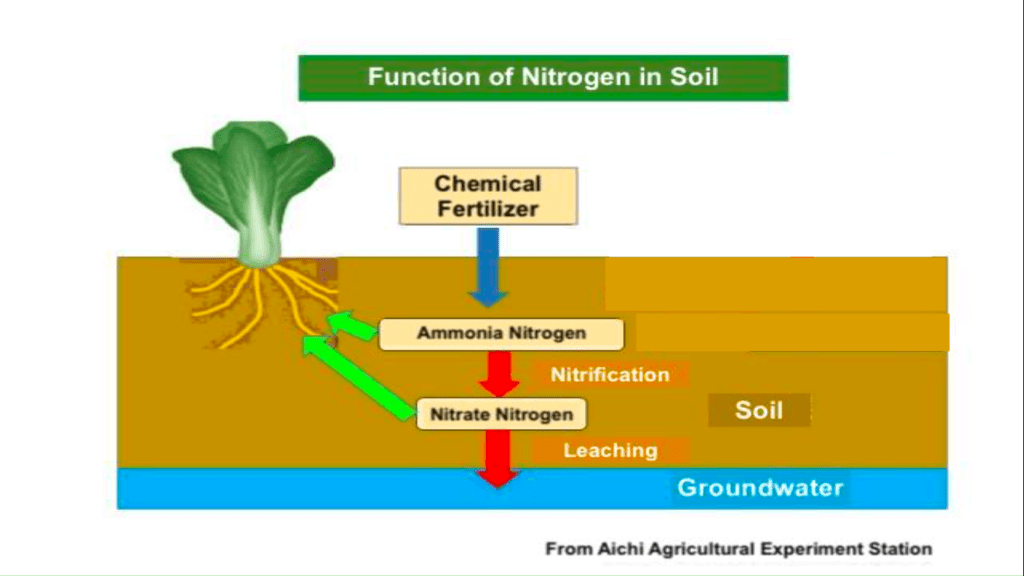
The Health Risks of Nitrogen
Further concern arises when nitrogen, as nitrite ion or sodium nitrite, contaminates underground waterways. When ingested, these substances can have serious health consequences. Sodium nitrite, an oxidizing agent, can cause hypotension, affect our blood oxygen transport, and even lead to death.
Nature’s Nutrient Balance for Plants
Even in organic farming, necessary amounts of nitrogen are produced. However, the essence of natural farming lies in nature’s control of this production, preventing excess. No reports of groundwater pollution or nitrogen overload exist from farms practicing Nature FarmFarming. The balance is carefully maintained by soil functions and microorganisms, ensuring no excess nitrogen remains in the soil.
Towards an Agro-Ecosystem Independent of Chemical Fertilizers
In summary, chemical fertilizers pose significant health risks, disrupt the balance of the ecosystem, and hinder the activities of beneficial soil microbes. This leads to loss of biodiversity, deforestation, and desertification.
Recent research further suggests that excessive nitrogen application can attract pests. Echoing Okada’s words, “Soil itself is fertilizer.” This implies that there’s no need for chemical fertilizers. All we need to do is keep the soil clean and pure. By aligning our efforts with the laws of the universe, we can maximize soil potential and work towards a healthier and more sustainable environment.


